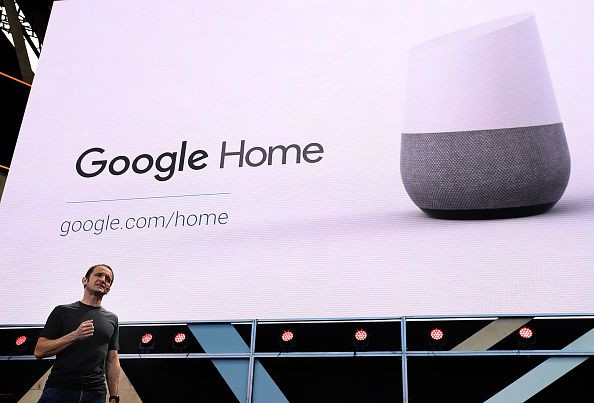After Amazon's Echo, Apple Music Might Be Coming To Google Home

It's only been a couple months since Apple (NASDAQ:AAPL) brought Apple Music to Amazon.com's (NASDAQ:AMZN) Alexa-powered Echo devices, but it seems the Mac maker is now putting its music streaming service on yet another platform: Alphabet's (NASDAQ:GOOG)(NASDAQ:GOOGL) Google Home. Users have reported seeing Apple Music listed as an option in an updated version of the Google Home app that rolled out today, although the link to sign in did not work.
The inclusion appears to be an oversight, as the Apple Music option was quickly removed after gaining unwanted attention. Nevertheless, adding support for Apple Music could still be incoming.
Embracing other platforms
In a statement provided to VentureBeat after users spotted the service's presence, a Google spokesperson said, "Apple Music is currently only available for Google Assistant users on mobile phones. We have nothing to announce regarding updates to Google Home."
However, lately we've seen Apple expanding its various services more aggressively to other platforms, more so than the Mac maker has historically done in the past. Beyond bringing Apple Music to Echo devices, the company also recently added iTunes to various Samsung smart TVs. Putting Apple Music on Google Home would fit right in alongside these other cross-platform moves.
Expanding cross-platform support for Apple Music is also an admission that Apple is lagging far behind its rivals when it comes to smart-home technology and the smart speaker market, two areas that are intricately linked. Amazon and Google collectively grabbed roughly two-thirds of smart speaker unit volumes in the fourth quarter, according to estimates from Strategy Analytics. The market is booming, with total shipments nearly doubling. Apple had 4% share, shipping an estimated 1.6 million HomePods.
In the smart-home space, Apple's HomeKit initially had incredibly stringent and onerous requirements. That inhibited adoption by device makers, and the company has since relaxed many of the stricter hardware requirements. In the meantime, Amazon and Google have expanded their leads in the smart-home market, which were built on their smart speaker sales.
Cross-platform support is key to Spotify's success
Apple's broader goal is to continue to push its growing services business. On the music front, Spotify (NYSE:SPOT) remains the largest paid music-streaming platform by a significant margin, with 96 million premium subscribers, or roughly twice the 50 million paid subscribers that Apple Music has. Spotify's dominance is thanks in large part to its ubiquity across devices of all shapes and sizes, including seamless integration with the most popular smart speakers.
In its fourth-quarter shareholder letter, Spotify wrote, "We believe home voice speakers are a critical area of growth, particularly for music and audio content, and we are evaluating a number of ways to explore and refine our offering in this arena."
It looks like Apple is trying to refine its strategy, too.
This article originally appeared in the Motley Fool.
John Mackey, CEO of Whole Foods Market, an Amazon subsidiary, is a member of The Motley Fool's board of directors. Suzanne Frey, an executive at Alphabet, is a member of The Motley Fool's board of directors. Evan Niu, CFA owns shares of Amazon, Apple, and Spotify Technology. The Motley Fool owns shares of and recommends Alphabet (A shares), Alphabet (C shares), Amazon, and Apple. The Motley Fool has the following options: long January 2020 $150 calls on Apple and short January 2020 $155 calls on Apple. The Motley Fool has a disclosure policy.




















